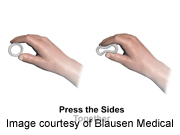

Treated Vaginal Ring Prevents HIV in Monkeys
Experts hope the technique might one day curb transmission in humans.
WEDNESDAY, Sept. 5 (HealthDay News) -- A vaginal ring that releases an anti-HIV drug protected laboratory monkeys against infection, a new study says.
The study shows that delivery of a microbicide from a vaginal ring can be effective, and suggests potential for the success of such rings in women, according to the researchers at the Population Council, an international nonprofit group.
However, research conducted with animals doesn't always produce the same results in humans.
Microbicides are substances that can be applied inside the vagina or rectum to protect against HIV, which is the AIDS-causing virus, and other sexually transmitted infections.
In this study, council scientists placed vaginal rings treated with either a microbicide or a placebo in macaque monkeys. The animals were then exposed to a single dose of SHIV, a virus that combines genes from HIV and SIV, the monkey version of HIV.
Two of 17 macaques with the microbicide vaginal rings became infected, compared with 11 of 16 macaques with the placebo vaginal rings. That means that the microbicide vaginal rings were 83 percent effective in protecting against the virus.
"This proof-of-concept study confirms that the investment in vaginal rings as a delivery system for HIV prevention is paying off," Naomi Rutenberg, vice president and director of the Population Council's HIV and AIDS Program, said in a council news release. "Our findings show that rings can deliver an anti-HIV drug to prevent infection."
An effective vaginal ring with microbicides would solve a common problem with microbicides in gel form, which is the risk that users will forget to use them or apply them improperly.
The Population Council wants to develop a vaginal ring that women can insert and leave in place for up to three months. Current models, used to prevent pregnancy, are treated with the hormones estrogen and progestin and placed in the vagina once a month.
More information
The U.S. Office on Women's Health has more about women and HIV/AIDS.
(SOURCE: Population Council, news release, Sept. 5, 2012)
Copyright © 2012 HealthDay. All rights reserved.
HealthDay news articles are derived from various sources and do not reflect federal policy. Womenshealth.gov does not endorse opinions, products, or services that may appear in news stories.
womenshealth.gov
A federal government website managed by the Office on Women's Health in the Office of the Assistant Secretary for Health at the U.S. Department of Health and Human Services.
200 Independence Avenue, S.W. • Washington, DC 20201


 Text size
Text size Email
Email
